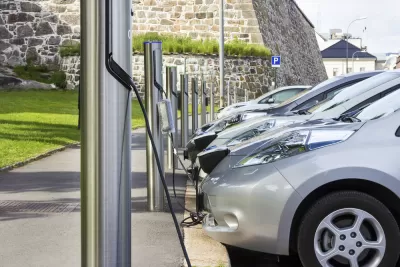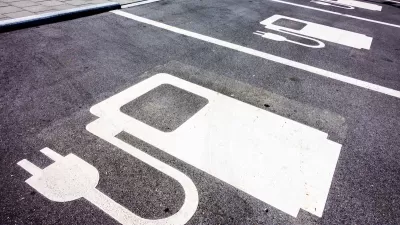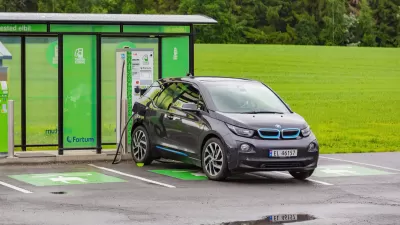Laws designed to protect car dealers against price competition from car manufacturers are, in many states, preventing electric car makers from selling directly to consumers.

In a piece in The Atlantic, Robinson Meyer calls out antitrust laws that protect U.S. car dealers from competition for preventing the more widespread adoption of electric vehicles. According to Meyer, more than half of U.S. states have laws that prevent automakers from selling directly to consumers—laws that Meyer calls "a major impediment to decarbonizing the American economy."
In 17 states, including Texas, Wisconsin, and Connecticut, laws forbid any automaker from opening a store and selling its vehicles directly to customers. Another 11 states, including New York, New Jersey, and Georgia, allow only one automaker, Tesla, to open stores and sell directly to state residents. If you want to buy a Ford truck, you have to go to a Ford dealership owned by a third-party company.
Meyer writes that restrictions on direct-to-consumer sales are crippling EV sales, pointing to the difference between New York, where the state offers plenty of incentives for buying EVs, with Florida, which does not offer the same benefits but, because of its more permissive dealership laws, saw twice as many electric car sales as New York in 2019 and 2020. Meanwhile, many traditional car dealerships are unprepared to sell EVs, lacking charging infrastructure or knowledgeable staff that can answer buyers' questions.
Now, three major electric car manufacturers have teamed up to wage the legal battles necessary to change these laws. Meanwhile, legacy carmakers are introducing more electric models, which dealerships will have to equip themselves to sell.
FULL STORY: The Simplest Way to Sell More Electric Cars in America

Alabama: Trump Terminates Settlements for Black Communities Harmed By Raw Sewage
Trump deemed the landmark civil rights agreement “illegal DEI and environmental justice policy.”

Study: Maui’s Plan to Convert Vacation Rentals to Long-Term Housing Could Cause Nearly $1 Billion Economic Loss
The plan would reduce visitor accommodation by 25% resulting in 1,900 jobs lost.

Planetizen Federal Action Tracker
A weekly monitor of how Trump’s orders and actions are impacting planners and planning in America.

Waymo Gets Permission to Map SF’s Market Street
If allowed to operate on the traffic-restricted street, Waymo’s autonomous taxis would have a leg up over ride-hailing competitors — and counter the city’s efforts to grow bike and pedestrian on the thoroughfare.

Parklet Symposium Highlights the Success of Shared Spaces
Parklets got a boost during the Covid-19 pandemic, when the concept was translated to outdoor dining programs that offered restaurants a lifeline during the shutdown.

Federal Homelessness Agency Places Entire Staff on Leave
The U.S. Interagency Council on Homelessness is the only federal agency dedicated to preventing and ending homelessness.
Urban Design for Planners 1: Software Tools
This six-course series explores essential urban design concepts using open source software and equips planners with the tools they need to participate fully in the urban design process.
Planning for Universal Design
Learn the tools for implementing Universal Design in planning regulations.
Caltrans
Smith Gee Studio
Institute for Housing and Urban Development Studies (IHS)
City of Grandview
Harvard GSD Executive Education
Toledo-Lucas County Plan Commissions
Salt Lake City
NYU Wagner Graduate School of Public Service





























